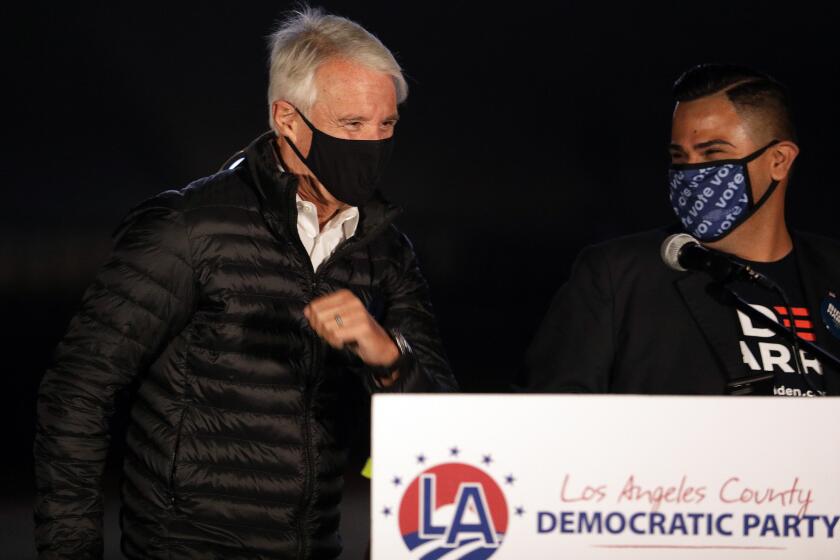California’s highest court could still curtail cash bail, upheld by the state’s voters
- Share via
Amid divisions among criminal justice reformers, voters have rejected a ballot measure to end cash bail in California, but the state’s highest court will probably have the final word.
A case pending before the California Supreme Court would require judges to consider a defendant’s ability to pay bail before requiring it. The court’s decision likely would be based on the California Constitution, making it harder to overturn at the ballot box.
The bail industry spearheaded Proposition 25, a referendum on a law enacted by then-Gov. Jerry Brown to replace bail with a risk assessment system. The industry hoped voters would reject the law, which passed over its objections.
A liberal coalition supporting the end of cash bail fractured at the last minute when the bill was amended to allow judges more flexibility in deciding who must remain behind bars. Some criminal defense lawyers worried that algorithms to be used to assess a defendant’s risk of flight or re-offending might themselves be biased and lead to defendants unnecessarily being kept in jail.
The split produced an unlikely but informal alliance against the measure: the bail industry, members of law enforcement and the American Civil Liberties Union of Southern California and Human Rights Watch.
“The bottom line is I think there was enormous confusion among people,” UC Berkeley law school dean Erwin Chemerinsky said.
The bail debate is not going away, though. Legislators may introduce a new bill, and the California Supreme Court is ready to weigh in.
“Cash bail is on life support,” said Robert Weisberg, co-director of the Stanford Criminal Justice Center. “It is going to disappear one way or the other. It may just go out with a whimper and not a bang.”
California Chief Justice Tani Cantil-Sakauye, who heads the state high court, supported the bail law that voters opposed in Proposition 25. A study by a group of judges she appointed also concluded he bail system unfairly hurt the poor.
The bail case before the court, In re Humphrey, stems from a 2018 San Francisco-based Court of Appeal decision that required judges to consider whether a defendant could afford bail and weigh nonmonetary alternatives.
“If the court determines that petitioner is unable to afford the amount of money bail it finds necessary to ensure petitioner’s future court appearances,” wrote 1st District Court of Appeal Justice J. Anthony Kline, author of the decision, “it may set bail at that amount only upon a determination by clear and convincing evidence that no less restrictive alternative will satisfy that purpose.”
The California Supreme Court, which already has allowed the decision be cited as precedent statewide, is expected to uphold the ruling.
Kirk Jenkins, an appellate lawyer and court analyst, said he did not believe the court would be swayed by voters’ decision on Proposition 25.
“If they think the precedents require the constitutional ruling,” Jenkins said, “I don’t think they’ll hesitate to affirm the Court of Appeal and essentially negate the proposition.”
The Court of Appeal’s decision stemmed from a bail hearing for Kenneth Humphrey, a retired shipyard laborer, who was charged with robbery in San Francisco in 2017 after being accused of stealing $5 and a bottle of cologne from a neighbor. Humphrey was 63 at the time, the neighbor, 79.
Humphrey had a criminal record, and a trial judge initially set bail at $600,000. The judge eventually reduced it to $350,000, which Humphrey still could not afford. Bail bonds companies require defendants to pay up to 10% of the bail amount even when the defendants show up to court. Humphrey did not have the $35,000 to obtain bail.
Following the ruling, Humphrey was released with an ankle monitor.
Legislators who coauthored the bail law voters rejected indicated Wednesday that they were considering whether to introduce new bail legislation next year, but have not decided yet to do so.
“The arc of the moral universe is long, but it bends toward ending cash bail,” said state Sen. Bob Hertzberg (D-Van Nuys), the primary author of the measure, Senate Bill 10. “Millions of dollars from the predatory bail industry may buy them some time, but it can’t overpower our movement toward justice.”
Sen. Scott Wiener (D-San Francisco), a coauthor of SB 10, called its repeal by the failure of Proposition 25 “absolutely devastating.”
“Money bail is classist and racist — no one should ever be held in jail or released based on how much money they have,” Wiener said Wednesday. “We cannot give up this fight, and we won’t give up.”
A new bill might take into account the objections of liberals who opposed SB 10.
“Prop. 25 would have eliminated money bail across the state of California by enacting a discriminatory risk assessment system in its place,” said Summer Lacey, director of criminal justice at the ACLU of Southern California, on Wednesday. “Risk assessment tools have proven to be racially and socioeconomically biased.”
Election 2020: As George Gascón leads Jackie Lacey for district attorney, other criminal justice reform candidates are pulling ahead.
The American Bail Coalition, which sponsored the No on Proposition 25 campaign, praised the election result.
“Voters have declared that they will not tolerate any effort to deny them the fundamental constitutional right to bail,” said Jeffrey J. Clayton, executive director of the American Bail Coalition, the organization that sponsored the referendum effort.
“We hope the state respects the will of the voters and instead looks to other reasonable pathways to bail reform.”
Staff writer Anita Chabria contributed to this report.
More to Read
Sign up for Essential California
The most important California stories and recommendations in your inbox every morning.
You may occasionally receive promotional content from the Los Angeles Times.
















